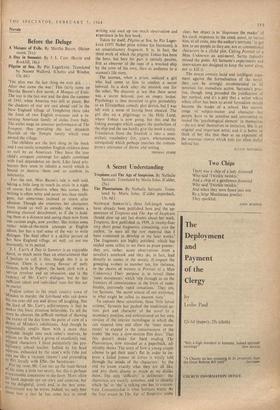Novels
Before the Deluge
'Thu play was the last thing we ever did. . . . After that came the war.' This fairly gums up Martha Bacon's first novel, A Masque of Exile. The war is the last war and the date the summer of 1941, when America was still at peace. But the shadows of war are cast ahead and in the New England village of Templeton these take the form of two English evacuees and a re- turning American family of exiles from Italy. The exiles stage an amateur performance of The Tempest, thus providing the last decadent flourish of the Temple family which once owned the village.
The children are the begt thing in the book and 1 can rarely remember English children done so well by an American. They have the true child's arrogant contempt for adults combined with frail dependence on them. Like fated aris- tocrats they seem to inhabit a world which is bound to destroy them and so confirm its inferiority.
For the rest, Miss Bacon's tale is well told, taking a little long to reach its crisis in a night of storm, but effective when this comes. Her Writing is often witty and never less than intelli- gent, but sometimes inclined to strain after allusion. Though she examines her characters from inside as well as outside, she retains a Pleasing classical detachment, as if she is hold- ing them at a distance and seeing them now from one curious angle, now another. She-makes some rather wide-of-the-mark attempts at English idiom, but has a real sense of the way to write dialogue. The final effect is a skilful picture of her New England village, set well, yet not too insistently, in its period.
J. I_ Carr's A Day in Summer is an enjoyable novel, so much more than an entertainment that
hesitate to call it this, though this it is in essence. There is a strong flavour of early Greene, both in Peplow, the bank clerk with a service revolver and an obsession, and in the cadency of Mr. Carr's dialogue, but he has sufficient talent and individual taste for this not to matter.
Peplow comes to the small country town of Minden to murder the fair-hand who ran down his ten-year-old son and drove off laughing. Not the least of Mr. Carr's achievements is that he makes this basic situation believable. To tell the story he chooses the difficult method of showing the events of the day from the point of view of a du/en of Minden's inhabitants. And though he occasionally credits them with a more than Probable insight into each other's motives, he creates on the whole a group of excellently real, Warped characters. I liked particularly the pro- bationary school teacher, bullied by his head Mistress, exhausted by the vicar's wife ('she just tises me like a vacuum cleaner') and pretending to flirt loyally with Effie, the hairdresser.
Pot' my taste, Mr. Carr ties up the main thread 01 his story a little too neatly, but this is perhaps a reasonable concession to the form. More often his book depends not on .story and suspense. but °0 the delightful, ironic and, in the best sense, Professional way he writes. Indeed, my only fear about him is that he has come late to novel
writing and used up too much observation and experience in his first book.
Taken by itself, Pilgrim at Sea, by Par Lager- kvist (1951 Nobel prize winner for literature), is an unsatisfactory fragment. It is, in fact, the third work of which the pilgrim Tobias has been the hero, but here his part is entirely passive, first as observer of the rape of a wrecked ship by the crew of his own, then as audience to a seaman's life story.
The seaman, when a priest, seduced a girl who had come to him to confess a secret beloved. In a dark alley she mistook one for the other. We discover at last that there never was a secret beloved, just an empty locket. Psychology is thus recruited to give probability to an Elizabethan comedy plot device, but I was left with a sense of having been cheated. The girl dies on a pilgrimage to the Holy Land, where Tobias is now going, but this and the linking passages which suggest the symbolism of the ship and the sea hardly give the book a unity. Translation from the Swedish is into a semi- archaic vocabulary (ire, yearn, whencesoever, unrequited) which perhaps matches the contem- porary relevance of theme arid setting.
THOMAS HINDE






































 Previous page
Previous page